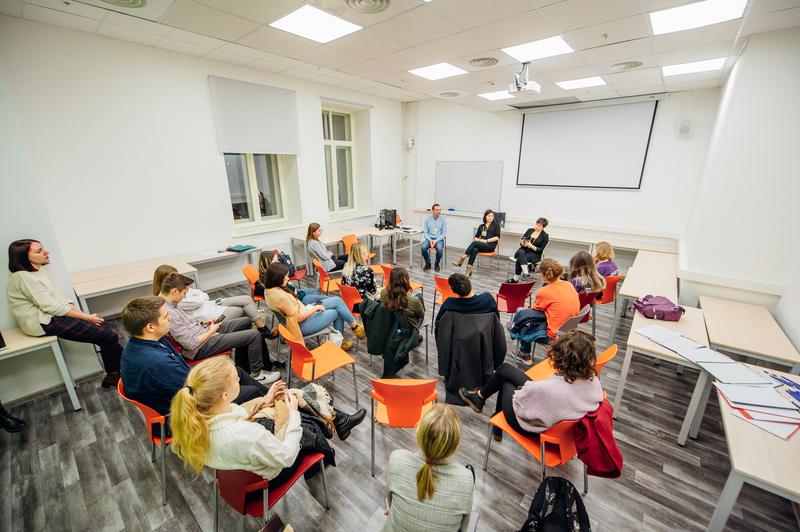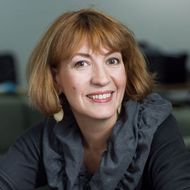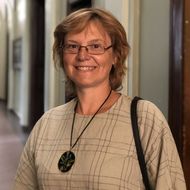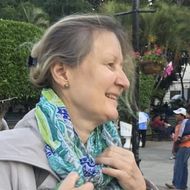HSE University Lecturers Share Their Pedagogical Insights

The winners of the autumn 2022 Innovations in Education competition presented their pedagogical insights at a teaching marathon held at the HSE University campus on Pokrovka. They shared their experience of implementing their developments, explaining how innovations help them in their daily work and how they affect the learning process.
The Innovations in Education competition is staged by HSE University twice a year and is open to lecturers from different campuses. Descriptions of implemented practices are accepted for the competition, and applications can be either individual or collective. The winners of the competition receive a financial reward, are invited to conduct master classes and training seminars, and their materials are posted on the official HSE website.
The Innovations in Education competition in autumn 2022 received 36 applications in three categories: ‘Freestyle Nomination’, ‘Original Solutions in Control/Assessment Activities, Including the Use of Digital Tools’, and ‘Original Solutions for Developing Knowledge Gained by Students in Data Culture Courses as Part of Educational Programmes’. Thirteen developments were named winners (five, four and four in each nomination respectively).
Participants in the teaching marathon were welcomed by Sergey Roshchin, HSE University Vice Rector and Deputy Chairman of the ‘Fund for Educational Innovation’ Board. He spoke about modern educational trends and innovations implemented by HSE University in recent years, sharing his predictions and recommendations with colleagues.

Sergey Roshchin
Sergey Roshchin noted that all undergraduate students at HSE University study Data Culture, a module of disciplines in digital literacy, programming and algorithmics, data analysis and machine learning. According to the Vice Rector's assessment, once students have mastered these digital competencies, they often have a better command of them than their teachers. These gaps are being bridged through teacher training and retraining in digital competencies.
The university is actively developing core educational programmes that are delivered entirely online.
Of the approximately 50,000 students across the four campuses, 1,500 are enrolled in online programmes—a high figure. It's no coincidence that HSE University was recently named online university of the year.
This format of work raises many questions: how to build communication, feedback, how to combine synchronous and asynchronous systems, the nature of the system of incentives, how to implement projects, etc. According to Sergey Roshchin, this is no longer terra incognita for teachers, but another colossal challenge.

Oksana Chernenko
During the teaching marathon, which lasted several hours, the winners of the autumn 2022 Innovations in Education competition shared their pedagogical findings. The moderator was Oksana Chernenko, Director for Innovations in Education at HSE University and Executive Director of the Fund for Educational Innovation.
Yulia Varlamova, Senior Lecturer in the Department of Foreign Languages at HSE University-St Petersburg, presented her methodology for using digital tools in the cross-campus discipline ‘English for Special Purposes’. This discipline is taught online in the bachelor’s programmes ‘Public Policy and Analytics’ (St Petersburg) and ‘Public Administration’ (Moscow). Digital tools are used as an auxiliary resource to accompany the discipline, enabling users to repeat and practise the material covered.

Yulia Varlamova
Among the tools discussed by the speaker are interactive videos, ‘shooters’ to help learning vocabulary, virtual journeys (for instance, when studying ‘Museum Management’, students move through the halls of a virtual museum, where tests await them in each one). One gamification element is ‘badges’: the lecturer awards virtual badges to students for certain achievements. Along with the ‘Idea Generator’, ‘Best Researcher’ and ‘Talented Leader’ badges, Yulia Varlamova uses the ‘Slowly but Surely’ badge, which is awarded to students who complete tasks correctly but fail to hand them in on time.
Another educational innovation was presented by Olga Tarabaeva, Associate Professor of the Faculty of Biology and Biotechnology at HSE University. While teaching organic chemistry to first-year students, she suggested that they come up with their own problems in this discipline that are chemically correct, have adequate solutions, and, most importantly, are interesting and demonstrate the connection between chemistry and life.

Olga Tarabaeva
One such task, devised by Olga Tarabaeva herself as an example to study the properties of alcohols, is about the bombardier beetle, which 'acts like an experienced synthetic chemist'. When threatened, two components stored in its protective glands are rapidly mixed in its abdomen, and the exothermic reaction between them, catalysed by enzymes, results in the formation of a hot mixture (100 degrees), which the beetle launches in the direction of its adversary. To solve the problem, it is necessary to determine the composition of this mixture and propose methods for preparing it under laboratory conditions.
In Olga Tarabaeva's course, students are not required to create problems, but doing so can result in getting an extra 0.5 points added to their cumulative grade (on a 10-point scale) and 1 point for the top three problems as voted for by students. Last year students developed 13 such problems—this year there are 30. There are about 50 students on the course, so there was a lot of interest. The tasks are devoted, for example, to specific actions of cyanide on Grigory Rasputin's body, the technology involved in creating Norwegian brown cheese ‘Brunost’, etc.
According to Olga Tarabaeva, this innovation is useful for both the students and the lecturer, who receives original materials for further work.
Presentations by other competition-winning HSE University professors focused on the joint use of low- and high-code approaches in teaching data analysis, the introduction of the game ‘Battleship’ in the teaching of ‘Management: Modern Concepts and Technologies’, team debates as a formative assessment of critical thinking skills, and other educational innovations.

